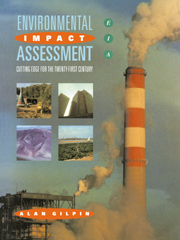Book contents
- Frontmatter
- Contents
- Abbreviations
- List of Checklists
- List of Figures
- List of Tables
- List of Maps
- Preface
- Chapter 1 EIA approaches
- Chapter 2 EIA procedures
- Chapter 3 EIA methodologies
- Chapter 4 Public participation, inquiries, and mediation
- Chapter 5 International organisations
- Chapter 6 Europe
- Chapter 7 The Nordic countries
- Chapter 8 North America
- Chapter 9 Asia and the Pacific
- Chapter 10 Towards the twenty-first century
- References
- Glossary
- Bibliography
- Index
Chapter 10 - Towards the twenty-first century
Published online by Cambridge University Press: 05 June 2012
- Frontmatter
- Contents
- Abbreviations
- List of Checklists
- List of Figures
- List of Tables
- List of Maps
- Preface
- Chapter 1 EIA approaches
- Chapter 2 EIA procedures
- Chapter 3 EIA methodologies
- Chapter 4 Public participation, inquiries, and mediation
- Chapter 5 International organisations
- Chapter 6 Europe
- Chapter 7 The Nordic countries
- Chapter 8 North America
- Chapter 9 Asia and the Pacific
- Chapter 10 Towards the twenty-first century
- References
- Glossary
- Bibliography
- Index
Summary
Clearly, EIA, particularly at the project level, will not change the world; nor is it designed to. For this reason, it is held in disdain by certain fundamentalist groups in the environmental movement. Such groups sometimes refuse to participate in scopings and assessments, or in commissions of inquiry. The failure of EIA is regarded as turning on two basic points; first, EISs, in either the private or public sectors, are prepared by the proponent and hence are distrusted; and, second, reviews of EISs and public inquiries are often conducted by government servants and hence are equally to be distrusted. Even outside reviewers are looked on as hand-chosen by government and that part of the culture which needs drastically revamping.
EIA procedures are seen simply as a servant, smoothing the more jarring aspects of development, and few projects are rejected. Assessments, it is felt, are undertaken within a short-term framework, excluding those long-term aspects upon which sustainable development depends.
International conferences such as the UN conferences of 1972 and 1992 are seen as talkfests, at which plenary speakers before, or after splendid meals, repeatedly declare ‘I speak with sincerity’. Many delegates are selected by governments for their ability to speak, rather than to act; and at home, for skill not so much in conservation, as in handling and keeping ahead of conservationists.
- Type
- Chapter
- Information
- Environmental Impact AssessmentCutting Edge for the 21st Century, pp. 158 - 161Publisher: Cambridge University PressPrint publication year: 1994



